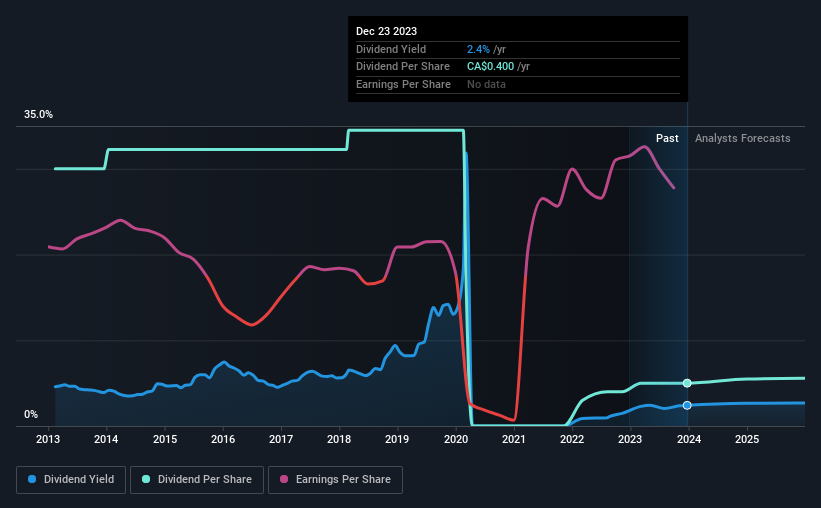Should You Buy Vermilion Energy Inc. (TSE:VET) For Its Upcoming Dividend?
Readers hoping to buy Vermilion Energy Inc. (TSE:VET) for its dividend will need to make their move shortly, as the stock is about to trade ex-dividend. The ex-dividend date is one business day before the record date, which is the cut-off date for shareholders to be present on the company's books to be eligible for a dividend payment. The ex-dividend date is of consequence because whenever a stock is bought or sold, the trade takes at least two business day to settle. This means that investors who purchase Vermilion Energy's shares on or after the 28th of December will not receive the dividend, which will be paid on the 15th of January.
The company's next dividend payment will be CA$0.10 per share, on the back of last year when the company paid a total of CA$0.40 to shareholders. Calculating the last year's worth of payments shows that Vermilion Energy has a trailing yield of 2.4% on the current share price of CA$16.6. Dividends are a major contributor to investment returns for long term holders, but only if the dividend continues to be paid. So we need to investigate whether Vermilion Energy can afford its dividend, and if the dividend could grow.
Check out our latest analysis for Vermilion Energy
Dividends are typically paid from company earnings. If a company pays more in dividends than it earned in profit, then the dividend could be unsustainable. Vermilion Energy has a low and conservative payout ratio of just 6.5% of its income after tax. That said, even highly profitable companies sometimes might not generate enough cash to pay the dividend, which is why we should always check if the dividend is covered by cash flow. Luckily it paid out just 14% of its free cash flow last year.
It's encouraging to see that the dividend is covered by both profit and cash flow. This generally suggests the dividend is sustainable, as long as earnings don't drop precipitously.
Click here to see the company's payout ratio, plus analyst estimates of its future dividends.

Have Earnings And Dividends Been Growing?
Companies with consistently growing earnings per share generally make the best dividend stocks, as they usually find it easier to grow dividends per share. If earnings fall far enough, the company could be forced to cut its dividend. It's encouraging to see Vermilion Energy has grown its earnings rapidly, up 63% a year for the past five years. Vermilion Energy looks like a real growth company, with earnings per share growing at a cracking pace and the company reinvesting most of its profits in the business.
The main way most investors will assess a company's dividend prospects is by checking the historical rate of dividend growth. Vermilion Energy has seen its dividend decline 16% per annum on average over the past 10 years, which is not great to see. Vermilion Energy is a rare case where dividends have been decreasing at the same time as earnings per share have been improving. It's unusual to see, and could point to unstable conditions in the core business, or more rarely an intensified focus on reinvesting profits.
The Bottom Line
Is Vermilion Energy worth buying for its dividend? Vermilion Energy has grown its earnings per share while simultaneously reinvesting in the business. Unfortunately it's cut the dividend at least once in the past 10 years, but the conservative payout ratio makes the current dividend look sustainable. Vermilion Energy looks solid on this analysis overall, and we'd definitely consider investigating it more closely.
So while Vermilion Energy looks good from a dividend perspective, it's always worthwhile being up to date with the risks involved in this stock. Every company has risks, and we've spotted 2 warning signs for Vermilion Energy (of which 1 is potentially serious!) you should know about.
A common investing mistake is buying the first interesting stock you see. Here you can find a full list of high-yield dividend stocks.
Have feedback on this article? Concerned about the content? Get in touch with us directly. Alternatively, email editorial-team (at) simplywallst.com.
This article by Simply Wall St is general in nature. We provide commentary based on historical data and analyst forecasts only using an unbiased methodology and our articles are not intended to be financial advice. It does not constitute a recommendation to buy or sell any stock, and does not take account of your objectives, or your financial situation. We aim to bring you long-term focused analysis driven by fundamental data. Note that our analysis may not factor in the latest price-sensitive company announcements or qualitative material. Simply Wall St has no position in any stocks mentioned.
